June 30, 2020
![]()
What do you do when it’s a pandemic and for over a decade 100 elementary students have been attending summer camp? Was cancelling the only option?
For ten years, The Cmolik Foundation has run a one week-long STEM focused summer camp for students from an inner-city school in Surrey on Simon Fraser University’s Surrey campus. In the past, students have explored new and cutting-edge technology such as building mini airplanes with 3D printers, flying drones, and using virtual and augmented reality on day trips to British Columbia Institute of Technology’s campus. Referred to as The Expanding Horizons program, the students ultimately earn a Tuition Passport of $1,000 through their participation which they can to apply to their post-secondary education upon secondary school completion.
Faced with the option of cancelling due to COVID-19, The Cmolik Foundation instead, created a virtual, STEM “camp-in-a-box” experience. Traditionally the Foundation has always tried to provide extraordinary learning experiences for students and, this year, virtual camp was no different. The first step was determining the guiding principles: camp should be fun (fostering a joy for learning), incorporate play, cultivate curiosity, focus on STEM learning, be entirely hands-on and provide activities that required little, if no, supervision (promoting their independence). Rather than simply leaving the students with boxes to navigate without any support at all, the Foundation continued to provide the teacher relationship as a key point of connection. Relationship has always been an important principle for the Foundation which recognizes the significant role teachers play in supporting students.
Working collaboratively with the teachers, the Foundation sourced some of the best available learning kits, resources and books so students could have a fabulous camp experience at home in their own backyard. Students engage in active learning without actually physically attending camp. The camp boxes contain STEM activities: decorating their camp t-shirts with simple electric circuits (“wearables”), using amazing, powerful Foldscopes (paper microscopes), building robotic hydraulic arms, experimenting with bacteria handwashing kits, creating projects with Snap Circuits and even using Electro Dough! Included in their boxes are beautiful books (eg. On a Beam of Light: A Story of Albert Einstein) that reinforce their learning. In addition, each of the major post-secondary institutions (UBC, SFU, KPU, BCIT) donated branded book bags, signature sunglasses, lunch kits and more for inclusion in the camp boxes. The idea was to make it feel a little like Christmas in July! Finally, at the end of each camp day, students will send photographic evidence to their teachers to demonstrate their learning and earn their Tuition Passports. The final Celebration at the end of camp features a video of the students with their STEM creations.
While it might not be the same as attending the camp in person, the students have been given the gift of some amazing learning resources to inspire the joy of learning and encourage them in their future aspirations.
Special thanks to the school and teachers for their collaboration on this project. For more information, contact Dr. Elisa Carlson (UBC Alumni) at The Cmolik Foundation.
Read more


